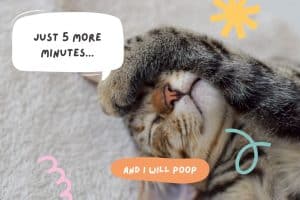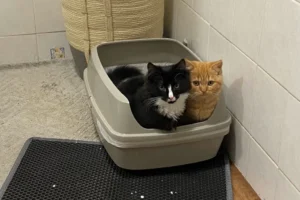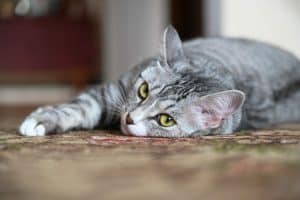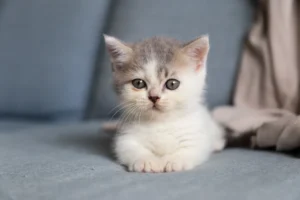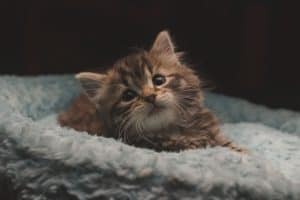Have you ever noticed your cat scooting on the floor after using the litter box and wondered why they do it? This common behavior can be puzzling for cat owners, but there are several reasons why cats engage in this peculiar post-poop routine. In this blog post, we will explore the reasons behind why your cat scoots after pooping and provide some helpful insights on how to address this behavior.
Answer:
When a cat scoots on the floor after pooping, it is often a sign of discomfort or irritation in their anal area. This behavior is typically a result of issues like impacted anal glands, parasites, or even constipation. It’s important to pay attention to your cat’s scooting behavior and address any underlying health issues to ensure their well-being.
Possible Reasons for Scooting
If you’ve ever wondered why your cat suddenly starts scooting after using the litter box, there could be a few reasons behind this peculiar behavior. One common cause is anal gland problems, where the small sacs located near the anus become impacted or infected. When these glands are irritated, cats may scoot to try and relieve the discomfort. Parasites, such as tapeworms, can also lead to scooting as they irritate the area. Additionally, constipation or diarrhea can cause discomfort, prompting your feline friend to scoot in an attempt to find relief.
Signs of Anal Gland Issues
When it comes to anal gland problems in cats, it’s essential to be on the lookout for telltale signs. Scooting is the most obvious indicator that something may be amiss with your cat’s anal glands. If you notice your cat repeatedly dragging their bottom across the floor, it’s time to investigate further. Excessive licking or biting near the tail area, redness, swelling, or pain when touched are also signs of potential anal gland issues. If you observe any of these behaviors, it’s crucial to consult your veterinarian for a thorough examination.
Additional Unique Insight: Keep an eye out for foul odor emanating from your cat’s rear end. A strong, unpleasant smell could indicate an infection or impaction in the anal glands. If you detect such an odor, it’s a clear sign that your cat may be experiencing anal gland problems.
How to Address Scooting Behavior
If you notice your cat scooting after pooping, it could be a sign of anal gland issues, parasites, or even constipation. The best course of action is to schedule a visit to the vet. A thorough examination will help pinpoint the exact cause of your cat’s discomfort. Your vet may recommend expressing the anal glands or prescribing medication to treat underlying issues.
In the meantime, you can also try some at-home remedies to alleviate your cat’s scooting behavior. Proper hygiene is essential, so make sure to keep your cat’s rear end clean and free from any fecal residue. Adding fiber to your cat’s diet can also help improve bowel movements and reduce the likelihood of scooting. Additionally, frequent grooming and regular vet check-ups can help prevent future scooting episodes.
Remember, addressing your cat’s scooting behavior promptly is crucial for their comfort and well-being. Don’t hesitate to seek professional help and follow your vet’s recommendations for the best results.
Additional Tip:
– Consider switching to a high-quality, grain-free diet to help promote healthy digestion and bowel movements in your cat.
Preventing Scooting in Cats
To prevent your cat from scooting after pooping, maintaining a healthy diet is key. Ensure your cat’s food is rich in fiber to promote regular bowel movements and prevent constipation. Proper hydration is also essential, so make sure your cat has access to fresh water at all times.
Regular grooming can also help prevent scooting behavior in cats. Keep your cat’s fur clean and trimmed around the rear end to reduce the likelihood of fecal accumulation. If your cat has long fur, a sanitary trim from a professional groomer can be beneficial in preventing scooting.
Lastly, consider incorporating probiotics into your cat’s diet to support a healthy gut flora, which can aid in digestion and overall gastrointestinal health. By taking proactive measures to promote your cat’s well-being, you can minimize the chances of them scooting after pooping.
Remember, a balanced diet, proper hydration, regular grooming, and preventive care are essential in keeping your cat happy and healthy.
Other Behavioral Reasons for Scooting
If your cat is scooting after using the litter box, it may not necessarily be a physical issue. Cats can also scoot due to stress or anxiety. Just like humans, felines can experience emotions that manifest in different ways. If your cat is feeling anxious or stressed, they may engage in scooting behavior as a way to cope with their emotions. It’s essential to create a peaceful and soothing environment for your furry friend to help alleviate any stress they may be feeling.
Interesting Facts About Cat Behavior
Did you know that cats have scent glands located near their tails? These glands secrete pheromones that help cats mark their territory and communicate with other felines. When a cat scoots after pooping, they may be leaving behind a scent to claim their freshly used litter box. This behavior is a way for cats to establish ownership and dominance in their environment. Keep this in mind as you observe your cat’s behavior and consider how they may be communicating with you and other pets in your home.
- Cats may scoot to cover up their scent and mask their presence in the area.
- Some cats may scoot out of habit, especially if they have been doing it for a long time.
- Ensure your cat’s litter box is clean and comfortable to encourage healthy bathroom habits.
- If your cat continues to scoot excessively, it’s essential to consult your veterinarian to rule out any potential health issues.
For more information on understanding and addressing your cat’s behavior, you can refer to helpful articles from reputable sources like the American Society for the Prevention of Cruelty to Animals (ASPCA).
Why Do Cats Scoot After Pooping?
Have you ever wondered why your cat scoots after using the litter box? This peculiar behavior can be quite alarming for pet owners, but it actually has a logical explanation. One common reason for cats to scoot is due to anal gland issues. Cats have two small glands located near their anus that produce a foul-smelling substance. When these glands become blocked or infected, it can cause discomfort for your feline friend, leading them to scoot to alleviate the irritation.
Understanding Anal Gland Problems:
If your cat is scooting after pooping, it’s essential to understand the potential underlying causes. Anal gland problems are a prevalent issue among cats and can be triggered by factors such as poor diet, obesity, or other health conditions. To address this concern, it’s crucial to consult with your veterinarian for a proper diagnosis and treatment plan. Your vet may recommend expressing the anal glands manually or prescribe medication to alleviate the discomfort.
Additional Insights and Suggestions for Cat Owners:
Maintain a Healthy Diet: A balanced diet plays a significant role in preventing anal gland issues in cats. Ensure your feline companion is consuming high-quality, nutritionally complete food to support their overall health and well-being.
Regular Vet Check-ups: Regular veterinary check-ups are essential for monitoring your cat’s anal gland health. Your vet can examine your cat’s anal glands during routine visits and address any potential concerns promptly.
Hygiene and Grooming: Proper hygiene and grooming practices can help prevent anal gland problems in cats. Keeping your cat’s bottom area clean and free from fecal matter can reduce the risk of blockages and infections.
Consult with a Professional: If you notice your cat scooting frequently or displaying signs of discomfort, it’s crucial to seek professional advice from a veterinarian. Your vet can determine the underlying cause of the scooting behavior and recommend appropriate treatment options.
Remember, as a responsible pet owner, it’s essential to prioritize your cat’s health and well-being. By understanding the reasons behind your cat’s scooting behavior and taking proactive steps to address any underlying issues, you can help your feline friend lead a happy and comfortable life.
Alex, a passionate animal lover, has experience in training and understanding animal behavior. As a proud pet parent to two dogs and three cats, he founded AnimalReport.net to share insights from animal experts and expand his knowledge of the animal kingdom.



